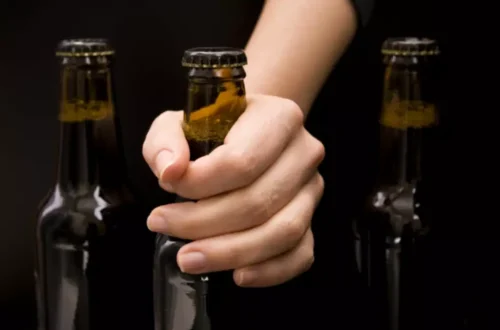
Most people intuitively know that alcohol equals unnecessary calories. Too much cortisol, however, encourages fat storage in the body (particularly in your mid-section) and is the hormone responsible for lowering testosterone levels. This is because alcohol activates starvation mode in the brain, which is why you may suddenly catch yourself eating an entire bag of Doritos after a long night out as if your life depended on it. Excess alcohol can also turn to fat in your liver and can raise the amount of fat in your blood, says Sonya Angelone, R.D., a spokeswoman for the Academy of Nutrition and Dietetics.
How alcohol links to weight gain

While alcohol doesn’t necessarily affect everyone the same way, it can cause some people to gain weight due to its high-calorie content and the way it affects metabolism, hunger-hormones, and decision making. If you want to enjoy a drink but limit your alcohol intake, try subbing in some of our favorite nonalcoholic drinks and spirits, several of which are low-calorie or low-sugar. In fact, drinking water before, during, and after drinking alcohol can help prevent its inflammatory effects on the body. If you’re feeling bloated while drinking alcohol, switch over to drinking water.
Ways Alcohol Intake Makes You Gain Weight
- It’s also more likely to be stored in your body as fat, she says.
- Alcohol is known to lower inhibitions, impairing the logical decision-making sections of your brain like the prefrontal cortex.
- Many can’t control their alcohol and the choices they make afterward.
- At Second Nature, you’re provided with a registered nutritionist or dietitian who can support you manage your alcohol intake to suit your lifestyle and preferences.
- This means you will most likely store those additional calories as fat while your body is trying to clear the byproducts of alcohol calories (3).
- Drinking alcohol with diabetes medicine, especially on an empty stomach, may cause low blood sugar.
Increased body fat due to low testosterone levels further impairs the body’s ability to effectively produce and utilize this hormone. This leads to a vicious cycle of weight gain and increased belly fat. Most heavy drinkers will develop a hefty beer gut or wine tummy. But even if you don’t consume massive amounts of alcohol, you could still be subjecting yourself to serious weight gain.
What and How Much Did You Drink?
If someone was already obese, they had a 35 percent higher risk of staying that way and gaining more weight. So alcohol will change your body shape with increased body fat, weight gain, and abdominal fat. But keep in mind this is exponentially increased if you’re a heavy drinker, eat bad fattening foods, and aren’t exercising. Health experts recommend that anyone who drinks should do so in moderation.
Does Drinking Alcohol Make You Gain Weight?
If you’re determined to improve your health and lose some weight, one of the most effective things you can do is cut out binge drinking. Eliminating alcohol is not necessary to lead a healthy lifestyle. It is perfectly fine to enjoy a glass of red wine with a meal, for example. The problem arises when people binge drink, i.e. having 3-4+ glasses of wine or pints of beer at once. There are several direct and indirect ways that heavy drinking can make you gain weight or, more specifically, gain body fat.


Drinking too much wine can cause you to consume more calories than you burn, which can lead to weight gain. Women who participated in binge drinking were not only more likely to have obesity but were also more likely to be attempting weight loss. Overall, Simon says, that the best protection against weight gain is «sticking to that average of four or less drinks a week for women, and less than two drinks a day for men.» Even once you sober up, other physical effects of alcohol can stand in the way of a healthy diet and exercise regimen. Males are more likely to gain abdominal fat from drinking than females.
Crouse and Grundy [48] looked at the effect of adding 630 kcal/day of alcohol to the diets of 12 men in a metabolic unit. There were no significant changes in weight for normal weight participants over the four-week intervention study. They however noted that about half of the obese participants gained weight, with the largest weight gain being 1.8 kg [48]. In a randomized crossover study, Cordain et al. [49] found that drinking two glasses of red wine (270 mL) with dinner daily for six weeks did not lead to changes in weight or body fat percentage in 14 men. Also, Beulens et al. [51] reported similar results in 34 male adults with large WC, consuming 450 mL of red wine per day for 4 weeks, compared to consuming alcohol-free wine for the same time period.
Alcohol as Food/Calories
They can contain up to two standard drinks worth of alcohol, doubling the calories from alcohol you’d get in a single shot. That means, even if you skip the sugary cocktail, there are still plenty of calories in your whiskey neat. While your decision making is impaired, you might be more prone to eat foods you’d normally avoid, or even to give up on your healthy diet entirely, Wyatt says. If you consume too much of it, you can develop alcohol poisoning or even die. This is important for potential weight gain because it dictates how your body reacts to alcohol. You do not have to forego alcohol entirely to control your weight.

Instead, your liver prioritizes breaking down alcohol rather than fat. The body can only metabolize a certain amount of alcohol every hour. How much alcohol you’re able to metabolize is dependent on your age, weight, sex, does alcohol make u gain weight and other factors. After a night out drinking, you may also notice bloating in your face, which is often accompanied by redness. Alcohol is an inflammatory substance, meaning it tends to cause swelling in the body.
- The exact number of calories can vary widely by drink and serving size.
- Alcohol can also influence hunger via several central mechanisms.
- In these studies, alcohol appears to have no effect on appetite, or to increase appetite [5].
- The worst alcohol you can drink is anything that contains sugar.
- The trillions of microbes in your colon and large and small intestines are critical to proper digestion.
Having too many drinks in one occasion means you’ll be ingesting hundreds of extra calories, if not thousands. So to recap where we are currently, you’ve just consumed anywhere from 1,000-2,000 calories at the pub, and now you’re inhaling another 1,500-2,000 calories of high fat, high sodium food. Alcohol also lowers testosterone levels which greatly slows your body’s ability to burn fat while at rest, further contributing to weight gain. If you fancy a good beer or glass of wine, chances are you’re ingesting more liquid calories than you realize.
